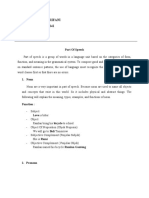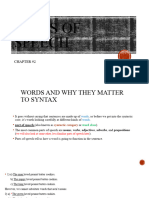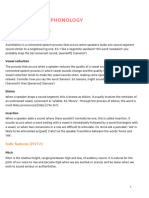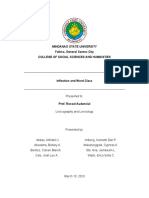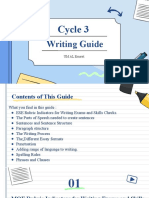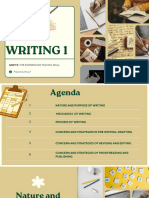Better Grammar
Better Grammar
Uploaded by
Naufal AbiyyuCopyright:
Available Formats
Better Grammar
Better Grammar
Uploaded by
Naufal AbiyyuOriginal Title
Copyright
Available Formats
Share this document
Did you find this document useful?
Is this content inappropriate?
Copyright:
Available Formats
Better Grammar
Better Grammar
Uploaded by
Naufal AbiyyuCopyright:
Available Formats
How good are you at grammar to deliver your answer?
Lesson 4. How good are you at grammar to deliver your
answer?
The Importance of Grammar in IELTS
Though in IELTS test, there is no actual grammar test section, all sections of the test
require your ability in grammar. Especially in Speaking and Writing, grammar
becomes one of aspects the examiners use to assess your performance.
In Writing Task 2 band descriptor (Public Version) for band 7 in the aspect of
grammatical range and accuracy, it is stated:
Uses a variety of complex structures
Produces frequent error-free sentences
Has good control of grammar and punctuation but may make a few errors
In Speaking Band Descriptor (Public Version), for band 7 it is also stated in the aspect of
grammatical range and accuracy:
uses a range of complex structures with some flexibility
frequently produces error-free sentences, though some grammatical mistakes persist
In brief, grammar plays an important role that a test taker should well concern to
achieve the high band score in IELTS.
In this lesson, grammar will be mainly discussed based upon 3 aspects:
1. Parts of Speech: Elements of Sentence
2. Time Occurrence (Tense Use)
3. Sentence Structure
Though grammar section is included in Writing Task 2, it is very important for you
to face other IELTS sections such as Writing Task 1, Listening, Reading and
Speaking.
Natures of IELTS- An In-Depth Learning | 113
How good are you at grammar to deliver your answer?
Grammatical Range and Accuracy
This part focuses on grammar by analyzing a single sentence based on three
aspects: elements of sentence, time occurrence and sentence structures
What Elements does it have?
Sentence What Tense does it show?
In What structure is it built?
1. Parts of Speech: Elements of Sentence
ADJECTIVE
NOUN VERB
ADVERB
PREPOSITION
Word Classes Correlation
1,1 The Main Word Classes (NOUN and VERB)
NOUN. To make it simpler, you can use a noun both as a subject or an object in
the forms of Noun Phrase, Gerund, or Gerund Phrase beside proper noun or
common noun.
Noun Phrase A comprehensive method to solve the problem is needed
Gerund Smoking is a bad habit
Gerund Phrase Leaving on the Jet Plane is my favorite song
VERB meanwhile, functions to show an action or state of being. A verb shows
what someone or something (Subject) is doing. In use, a verb sometimes changes
dependent upon the time of occurrence (tenses – later discussed more deeply).
Verb can be categorized into:
a. Action Verb: Walk, Write, Read
Woman reads a novel
b. Verb “To be” or Linking Verb : am, is, are (present) was, were (past)
She is an iron woman
c. Modal Verb: Can, Could, Will, Would, Might, May, Shall, Should, Ought to
Working late might trigger stress
Natures of IELTS- An In-Depth Learning | 114
How good are you at grammar to deliver your answer?
In use, a VERB can in the form of Active Voice and Passive Voice. Voice
indicates whether the subject is acting or being acted upon.
Active Voice Passive Voice
The government issues a new policy A new policy is issued
The government is now discussing A new policy is being discussed
about a new policy
Verb also sometimes changes – dependent upon the tense (time occurrence) of the
sentence. The change can be regular or irregular (it is discussed in TENSES – time
occurrence).
1.2. Additional Word Classes
Some additional word classes (adjective, adverb, preposition, pronoun and
conjunction) are needed to modify or give additional information to NOUN or
VERB. To explain how these additional word classes are used to modify NOUN or
VERB, it might better, in my opinion, to discuss it by explaining one of features of
academic writing that is COMPLEXITY that means that written language is
relatively more complex than spoken language –it is lexically dense (there is a higher
proportion of content words per clause). Formal written English uses nouns and
nominal group (noun-based phrases) more than verbs. This can be done by
modification of nouns to form nominal groups.
A typical nominal group is structured in the following way
Head
Determiner Pre-Modifier (A Noun as Subject Post-Modifier
or Object)
A Complicated Solution To a problem
From the noun phrase “A complicated solution to a problem” above, it can be seen
how the subject Solution as the head or main word is given some additional word
classes that can be grouped into 3: Determiner, Pre-Modifier (adjective placed
before a noun) and Post-Modifier (modifying a noun and it is placed after a noun)
ADJECTIVE in Part of Speech functions to modify a noun. It can be as placed
either as the Determiner, Pre-modifier or as Post-Modifier.
Determiners such as article (a, an, and the), some, many, a number of, several,
few, or more, are adjective to show the quantity and status of Subject. Remember, a
noun mostly needs a determiner.
Basically, an adjective has three forms in use: Positive, Comparative and
Superlative.
Natures of IELTS- An In-Depth Learning | 115
How good are you at grammar to deliver your answer?
Positive
Comparative Superlative
One-syllable adjective High higher the highest
Three-syllable more productive The most
or more adjective productive less productive productive
The least
productive
Adjective ending in –y wealthy wealthier the wealthiest
Short adjective ending with a
hot hotter the hottest
consonant/vowel/consonant
Irregular good better the best
Regarding the word form, adjective can be in the form of”
Common Adjective with the a number of endings
-ent (excellent) -ive (decorative)
-ant (important) -ous (generous)
-ful (careful) -al (bilingual)
-ic (tectonic) -able (capable)
-less (meaningless) -ible (impossible)
Ing-participle: it means an adjective explaining that noun actively makes it
happen.
Breaking News (it means that the news has made other programs break
(active)
Ed-Participle (It means an adjective explaining that noun accepts (passive)
Haunted house (it means that ghost haunts the house)
Related to the Complexity in Noun, beside those forms of adjective can be as the pre -
modifiers, they can also be as the Post-modifier.
- A brake consisting of a drum divided into twelve compartments (ing-participle)
- Canoes preserved by a hard plaster (ed-participle)
ADVERB modifies a verb, an adjective or another adverb. It is mostly formed
from adjective such as careful – carefully, promising – promisingly
Adverb modifying a verb: She shouted her friend loudly
Adverb modifying an adjective: She has a very loud voice
Adverb modifying another adverb She listened very carefully
Note: an adverb modifying a verb can be put in some places.
Natures of IELTS- An In-Depth Learning | 116
How good are you at grammar to deliver your answer?
She shouted her friend loudly.
She loudly shouted her friend.
Loudly, she shouted her friend.
However, adverb modifying a verb cannot be put between verb and object.
She shouted loudly her friend.
When an adverb modifies an adjective or another adverb, it must be placed before
the adjective or another adverb.
PREPOSITION is a word (or group of words) that shows the relationship
between its object (a noun or a pronoun that follows the preposition) and another
word in the sentence.
The cat is sleeping under the table (object of preposition modifying verb is
sleeping)
The woman with the red jacket is writing a journal (object of preposition
modifying subject the woman)
There are three kinds of preposition: simple (at, in, on, with), compound (within,
outside, underneath) and phrasal (on account of, on top of).
Preposition
Aboard Back of Except Of Through
About Because of Except for Off Throughout
Above Before For On Till
According to Behind From On account of To
Across Below In On behalf of Towards
Across from Beneath In addition to Onto Under
After Beside In behalf of On top of Underneath
Against Besides In front of Opposite Until
Along Between In place of Out Unto
Alongside Beyond In regard to Out of Up
Alongside of By Inside Outside Up to
Along with By means of In spite of Over Upon
Amid Concerning Instead of Owing to With
Among Considering In terms of Prior to Within
Apart from Despite In view of Regarding Without
Around Down Into Round
Aside from Down from Like Since
At During Near Subsequent to
Away from Notwithstanding Together with
Practice 1
After learning about the use of noun and its relationship with other additional word
classes i.e. determiner, adjective, adverb and preposition, identify the word class of
Natures of IELTS- An In-Depth Learning | 117
How good are you at grammar to deliver your answer?
the randomized words below and rearrange them to form a noun-based phrase to
create a complexity.
1. approach – different - a – fundamentally
2. in - a – promising –era - very – job – millennial –the
3. populated – in - the – country – the – most – world
4. the - prepared - January- the - well - ceremony - in - of - very – mid
5. blind – called - Braille – writing - for - a - of - the system
PRONOUN is a word used to replace a noun. All pronouns must have
antecedent – a noun which the pronoun refers to or replace.
Singular
Nominative Possessive Objective
Case Case Case
1 st person I My, mine Me
2 nd person You Your, yours You
3 rd person He His Him
She Her Her
It Its It
Plural
Nominative Possessive Objective
Case Case Case
1st person We Our, ours Us
2nd person You Your, yours You
3rd person They Their, theirs Them
Classes of Pronouns
Relative
Who, whose, whom, which, what, that
Demonstrative
This, that, these, those
Interrogative
Who, whose, whom, which, that
Intensive and Reflexive
Myself, himself, herself, yourself, themselves, ourselves
Indefinite Pronouns
All Both Everything Nobody Several
Another Each Few None Some
Any Each one Many No one Somebody
Anybody Either Most Nothing Someone
Anyone Everybody Much One Something
anything Everyone Neither Another Such
Natures of IELTS- An In-Depth Learning | 118
How good are you at grammar to deliver your answer?
In IELTS, the proper use of references, i.e. pronoun
is deemed important as it can help to result in the
cohesion or interrelation among sentences in a
paragraph. This then can improve the score for the
aspect of Coherence and Cohesion
Study some examples in the use of pronouns in IELTS essay of Writing Task 2
IELTS
Personal pronouns: (I, you, he, she, it, we, they, one, them)
Global warming is now top of the agenda for most governments.
However, they are unlikely to take the steps necessary to tackle it.
Demonstrative pronouns: this, that, these, those.
These days, it is often the case that children are neglected. This may be
because of the fact that many parents in cities now both have to work so are
often not around to give their children support when needed.
Possessive adjectives: (my, your, his, her, their, one’s, its, our).
Parents also have to take more responsibility for their children’s actions.
CONJUNCTION functions to connect individual words or group of words
(phrase or clause). There are 3 kinds of conjunction commonly used in a sentence:
coordinating conjunction, correlative conjunction and subordinating
conjunction.
Coordinating When we came back, it was clear and cold (and connects
Conjunction two equal words)
and, but, or, so, yet, The man working on the roof and cutting the wood is my
nor brother (and connect two equal/parallel phrases)
Writing an essay seems to be hard so it needs a good
plan (so connects two clauses)
Correlative/Paired
Conjunctions
Neither …nor….
Either …..or…. Neither government nor private party can offer a proper
solution for this conflict.
Not only…but also….
Both… and…..
Whether …. Or….
Natures of IELTS- An In-Depth Learning | 119
How good are you at grammar to deliver your answer?
Subordinating
Conjunction
After, although, as, as if, Although it is hard to do, I believe there is a way to cope with
as long as, because, it.
before, if, provided that,
whereas
2. Time Occurrence (Tenses Use)
Now try to write one sentence in each square below describing:
1. Something you do every day.
2. Something you are doing right now.
3. Something you did in the past at an unspecified time.
4. Something you started in the past that you are still doing now.
1. 2.
3. 4.
English has 12 tenses divided into 3 times: Past, Present, and Future, each of
which equally has 4 aspects: Simple, Continuous, Perfect, and Perfect
Continuous, which of course express a different function and meaning in terms of
time occurrence.
Simple Present functions to show:
1. Routine actions: He goes to the market every weekend.
2. Facts and permanent situations - The sky is blue.
3. Directions or instructions - Turn right at the corner and walk for fifty meters.
- Open the box and then remove the plastic.
Present Continuous functions to show:
1. An action happening as we speak.
I’m doing some housework.
2. Something ongoing but not necessarily happening right now
I’m reading a book called On the Road.
3. a developing situation
It is getting dark outside.
Present Perfect functions to show:
An action or something that is already done in the past without stating a particular
time. It is for example to answer the question “Have you ever visited Bali?” and
it is answered: “Yes, I have ever visited Bali”. Here, the purpose of present perfect
Natures of IELTS- An In-Depth Learning | 120
How good are you at grammar to deliver your answer?
is only to say an experience that we have. When a definite/certain time in the past
is added, then past tense will be used: “I went there two years ago”
Present Perfect Continuous functions to show:
An ongoing activity and the length of time that it has continued. Simply, this
tense is to show the duration so far from an activity that is still being done.
Say, it is to answer a question “How long have you been learning
Grammar?”
We have been learning Grammar for 1 hour
Aspect Sentence
Simple The woman writes a novel everyday
Present
Continuous The woman is writing a novel now
Perfect The woman has written a novel
Perfect The woman has been writing a novel for three hours
Continuous
Aspect Sentence
Simple The woman wrote a novel yesterday
Past
Continuous The woman was writing a novel when I visited her last night
Perfect The woman had written a novel when I visited her last night
Perfect The woman had been writing a novel for three hours when I
Continuous visited her last night.
Aspect Sentence
Simple The woman will write a novel everyday
Future
Continuous The woman will be writing a novel now
Perfect The woman will have written a novel
Perfect The woman will have been writing a novel for three hours
Continuous
3. Sentence Structure
3.1. Clause
Talking about sentence structure means talking about clause. Principally, a sentence
is built from or contains a clause or more than one clause. A clause refers to a group
of words that at least have one subject and one verb.
Clause itself is divided into two kinds: Independent Clause and Dependent Clause
It contains a subject, a verb and often a complement.
It expresses a complete thought.
independent
It can stand alone as a sentence by itself.
clause
The proportion of elder people is increasing
Subject Verb
Natures of IELTS- An In-Depth Learning | 121
How good are you at grammar to deliver your answer?
It begins with a subordinator (i.e. when, while, if, that, or who)
followed by a subject and a verb
dependent clause
It is not a sentence by itself for not expressing a complete thought.
It is also called a sentence fragment because, by itself, it is an
incomplete sentence, and it is an error.
When the proportion of elder people is increasing
Subordinate Subject Verb
3.2 Types of Sentence Structure
Simple The high crime rate among teenagers in urban areas increases
Sentence recently.
Subject verb
Using coordinate connector (For, And, Nor, So, But, Yet, Or)
Japanese people live longer than other nationalities , for they
consume healthful diet .
Compound Using Semicolon (;)
Sentence Japanese people consume healthful diet; they live longer
Using Conjunctive Adverb (however, in contrast, on the other hand,
therefore)
Japanese people consume healthful diet; therefore, they live longer.
Complex I. Complex Sentence with Noun Clause
Sentence What you did was wrong
Connector S+V
II. Complex Sentence with Adverb Clause
When you write a piece of academic writing, you need to make
sure it well-organized
III. Complex Sentence with Adjective Clause (who, which,
that)
A leader that can make employees secured is an ideal figure
Compound
Complex I love that book that you showed me, so I need to have it soon
Sentence
Natures of IELTS- An In-Depth Learning | 122
You might also like
- You2 by Price Pritchett Gaining Confidence in Your Goals PDFDocument1 pageYou2 by Price Pritchett Gaining Confidence in Your Goals PDFWicaksono DwikyNo ratings yet
- Morphology & Syntax "Morpheme Forms": Page - 1Document10 pagesMorphology & Syntax "Morpheme Forms": Page - 1محمد ناصر عليويNo ratings yet
- Detailed Lesson Plan For English Grade VIDocument6 pagesDetailed Lesson Plan For English Grade VIReneza Reyes Verallo100% (2)
- English Work Grade 10 Class F: Work Summarizing To Be Delivered and For Effects of EvaluationDocument9 pagesEnglish Work Grade 10 Class F: Work Summarizing To Be Delivered and For Effects of EvaluationdelsonjacobdesousaoficialNo ratings yet
- Clasificación de Palabras en InglesDocument6 pagesClasificación de Palabras en InglesGerald SiraNo ratings yet
- By Rahaf Alhaidar Grammar in UseDocument16 pagesBy Rahaf Alhaidar Grammar in Usetala12.oleNo ratings yet
- E9 Adjective&adverbDocument5 pagesE9 Adjective&adverb29camziiNo ratings yet
- Unit I - Grammar: Read and Make A Summary of Your LearningDocument10 pagesUnit I - Grammar: Read and Make A Summary of Your LearningMariangel PerezNo ratings yet
- Check Sheet 002 Word ClassDocument3 pagesCheck Sheet 002 Word ClassFernanda BarrosNo ratings yet
- Learn Adverbs As Part of Speech For Bank 1Document10 pagesLearn Adverbs As Part of Speech For Bank 1waseemNo ratings yet
- Part of Speech - Rafi Arifani - 8040210241Document7 pagesPart of Speech - Rafi Arifani - 8040210241Rafi ArfniNo ratings yet
- Parts of SpeechDocument3 pagesParts of SpeechAyu MaharaniNo ratings yet
- Phrases Ch-1 PDFDocument5 pagesPhrases Ch-1 PDFZay Lin HtunNo ratings yet
- Handout 2Document4 pagesHandout 2aydi.en.2024No ratings yet
- Topic 3 Morphology PDFDocument13 pagesTopic 3 Morphology PDFTan BrandonNo ratings yet
- SYNTAX zz-1 - 102838 - 054022 - 112454Document124 pagesSYNTAX zz-1 - 102838 - 054022 - 112454Ratifu ChinahovaNo ratings yet
- Morphology Unit4Document25 pagesMorphology Unit4ferasORVNo ratings yet
- Seminarski RadDocument19 pagesSeminarski RadrifkonjaNo ratings yet
- Unit10. Lexis. Characteristics of Word Formation in English. Prefixation, Suffixation and Compounding.Document5 pagesUnit10. Lexis. Characteristics of Word Formation in English. Prefixation, Suffixation and Compounding.Miriam Reinoso SánchezNo ratings yet
- Vocabulary DevelopmentDocument52 pagesVocabulary DevelopmentKing AhmedNo ratings yet
- U1C1PDF Phrases and Clauses Self-StudyDocument8 pagesU1C1PDF Phrases and Clauses Self-StudyValentina Valenzuela RochaNo ratings yet
- Parts of Speech-Chapter2Document31 pagesParts of Speech-Chapter2نبيل العساليNo ratings yet
- Tommy BoyDocument8 pagesTommy BoyawaiskhattakNo ratings yet
- Lesson 8. Lexical Categories Introduction DiscussionDocument6 pagesLesson 8. Lexical Categories Introduction DiscussionColleen CastueraNo ratings yet
- Eng Lang 1Document52 pagesEng Lang 1cringerNo ratings yet
- Wa0007.Document25 pagesWa0007.malimaksum1234No ratings yet
- Derivation and Inflection MorphemeDocument11 pagesDerivation and Inflection MorphemeGilbert MalauNo ratings yet
- ApplcnDocument28 pagesApplcnHarsh goelNo ratings yet
- Derivational & Inflectional MorphologyDocument14 pagesDerivational & Inflectional MorphologyMishell CamachoNo ratings yet
- Isl W1Document3 pagesIsl W1Alex MurphyNo ratings yet
- LanguageDocument11 pagesLanguageJanice RomeroNo ratings yet
- Teaching Word Partsfinalv2Document7 pagesTeaching Word Partsfinalv2Ahmad FaragNo ratings yet
- Grade 6: ADJECTIVES, ADVERBS, AND OTHERDocument30 pagesGrade 6: ADJECTIVES, ADVERBS, AND OTHERalakweiNo ratings yet
- English PapersDocument9 pagesEnglish Papersnurhabibah Al-HafidzahNo ratings yet
- Lecture 3. Morphological ProcessesDocument7 pagesLecture 3. Morphological Processesbermet tursunbaevaNo ratings yet
- What Is Morphology? - Brief ExplanationDocument21 pagesWhat Is Morphology? - Brief ExplanationLeony GuedesNo ratings yet
- Seminar 1, Lexicology, ZHD 202Document10 pagesSeminar 1, Lexicology, ZHD 202Дильназ ЖалалдинNo ratings yet
- Final Report in MorphologyDocument27 pagesFinal Report in MorphologyalohaNo ratings yet
- Grammatical Units: They Are Meaningful and Combine With Each Other in Systematic WaysDocument8 pagesGrammatical Units: They Are Meaningful and Combine With Each Other in Systematic WaysNoe GonzalezNo ratings yet
- English HandbookDocument59 pagesEnglish HandbookhelpNo ratings yet
- Introduction To WordsDocument11 pagesIntroduction To WordsBlue MoonNo ratings yet
- From Words To Major Phrase TypesDocument9 pagesFrom Words To Major Phrase TypesRahmaNo ratings yet
- I. Rules and Uses: The AdverbDocument9 pagesI. Rules and Uses: The AdverbDiana GonzaliNo ratings yet
- Inflection Word Class - Written ReportDocument17 pagesInflection Word Class - Written ReportJochebeb ToledoNo ratings yet
- Morphology: Prof. K.T.KhaderDocument50 pagesMorphology: Prof. K.T.KhaderHani QarmootNo ratings yet
- VOCABULARY NotesDocument26 pagesVOCABULARY Notesbhargav tanguduNo ratings yet
- The 9 Parts of Speech - Definitions and Examples142049Document10 pagesThe 9 Parts of Speech - Definitions and Examples142049Syarifah YanaNo ratings yet
- Compounding & Inflection: Head Word Grammatically SemanticallyDocument6 pagesCompounding & Inflection: Head Word Grammatically SemanticallyAngel Gustilo CasilaNo ratings yet
- Writing GuideDocument86 pagesWriting GuideSedra Mousa Al Samara mousa almokdad Almokdad al samara100% (1)
- The 9 Parts of SpeechDocument6 pagesThe 9 Parts of SpeechLeonardo ColjaNo ratings yet
- NOTES SOFT SKILLS 1 Unit1 2020 2021Document26 pagesNOTES SOFT SKILLS 1 Unit1 2020 2021Neeraj YadavNo ratings yet
- Engpro FinalsDocument19 pagesEngpro FinalsAlyanna ManaloNo ratings yet
- Morphology 1Document32 pagesMorphology 1bryle abbah depedroNo ratings yet
- 9 Parts of SpeechDocument4 pages9 Parts of SpeechFACHRIANI -2020-BLOK 3100% (1)
- Structure of English ModuleDocument26 pagesStructure of English ModuleSai Guyo50% (2)
- DELTA - Grammar and VocabularyDocument6 pagesDELTA - Grammar and VocabularyTina GalgotiaNo ratings yet
- Advanced Notes Version 2Document41 pagesAdvanced Notes Version 2Janvier NiyonzimaNo ratings yet
- Sentence (CMS 107)Document19 pagesSentence (CMS 107)amosadjartey42No ratings yet
- Class 1 Type of PhrasesDocument9 pagesClass 1 Type of PhrasesŤäqwa FäwziNo ratings yet
- Unit 06Document14 pagesUnit 06anubhavsing87No ratings yet
- Assignment 1.0 PDFDocument6 pagesAssignment 1.0 PDFDaniyal AsifNo ratings yet
- Lydia Furman (Israel) Wolf Messing. Russian To English TranslationDocument3 pagesLydia Furman (Israel) Wolf Messing. Russian To English Translationtractorbeaming0% (1)
- Pipeline IntegrityDocument120 pagesPipeline Integritydrramsay100% (6)
- Animal Care Cover LetterDocument8 pagesAnimal Care Cover Letterf5dpebax100% (2)
- (Formerly Ramon Magsaysay Technological University) : Republic of The PhilippinesDocument14 pages(Formerly Ramon Magsaysay Technological University) : Republic of The PhilippinesSandralyn Acera SuarezNo ratings yet
- Lesson 8 (1-6)Document2 pagesLesson 8 (1-6)ElleNo ratings yet
- Anthropometry and Clothing ConstructionDocument9 pagesAnthropometry and Clothing ConstructionAsif MangatNo ratings yet
- Dont Go Back To EgyptDocument50 pagesDont Go Back To EgyptallforjesusmbcNo ratings yet
- 100 Item Exam On Fundamentals of NursingDocument54 pages100 Item Exam On Fundamentals of NursingYen Valien Cugay100% (1)
- Density Italian RyegrassDocument9 pagesDensity Italian RyegrassjeliNo ratings yet
- Multicultural LiteratureDocument12 pagesMulticultural Literaturemisterash100% (1)
- A Study On Food Habits and Its Awareness Among Adolescents Students in BangaloreDocument6 pagesA Study On Food Habits and Its Awareness Among Adolescents Students in BangaloreAparnaaVenkatesanNo ratings yet
- Writing As A Micro-SkillDocument54 pagesWriting As A Micro-Skillsammy elisanNo ratings yet
- 17 Bagtas v. PaguioDocument3 pages17 Bagtas v. PaguioFrancis FlorentinNo ratings yet
- STUDENT HANDOUT - Event Management Body of Knowledge ProjectDocument17 pagesSTUDENT HANDOUT - Event Management Body of Knowledge ProjectmooseNo ratings yet
- Seminar Paper: "Reading Is Art, Relieves Stress and Reduces Depression"Document3 pagesSeminar Paper: "Reading Is Art, Relieves Stress and Reduces Depression"Zimrisha KupaNo ratings yet
- 2) Literary CriticismDocument36 pages2) Literary CriticismArtchie BurcaNo ratings yet
- Qcourt: I/Epublic of Tbe .Fjbilippine!IDocument10 pagesQcourt: I/Epublic of Tbe .Fjbilippine!IElizabeth Jade D. CalaorNo ratings yet
- Life Review in Groups - KorteDocument10 pagesLife Review in Groups - KorteLucasNo ratings yet
- Evaluation Surety BondDocument2 pagesEvaluation Surety BondSheng RamonesNo ratings yet
- B5 Inelastic Analysis of Structures PDFDocument9 pagesB5 Inelastic Analysis of Structures PDFHenry LimantonoNo ratings yet
- From The Lands of The Scythians Ancient TreasuresDocument162 pagesFrom The Lands of The Scythians Ancient TreasuresAnonymous FbGDFkw100% (7)
- Narrative Report Week 1Document2 pagesNarrative Report Week 1Rembrant FernandezNo ratings yet
- Jiptummpp GDL Ghanesrind 35689 1 Pendahul NDocument32 pagesJiptummpp GDL Ghanesrind 35689 1 Pendahul NAdamNo ratings yet
- Discuss The Conflict Between Good and Evil in Paradise LostDocument2 pagesDiscuss The Conflict Between Good and Evil in Paradise LostAbdul Nisar Jilani100% (2)
- Talovikova PDFDocument13 pagesTalovikova PDFManuel CebolloNo ratings yet
- Describing People1Document1 pageDescribing People1Ирина МельникNo ratings yet
- GRAMATICA Unidad 4Document8 pagesGRAMATICA Unidad 4lucero taimalNo ratings yet
- DSL-2730U U1 Manual v1.01Document79 pagesDSL-2730U U1 Manual v1.01Sandeep KBNo ratings yet











